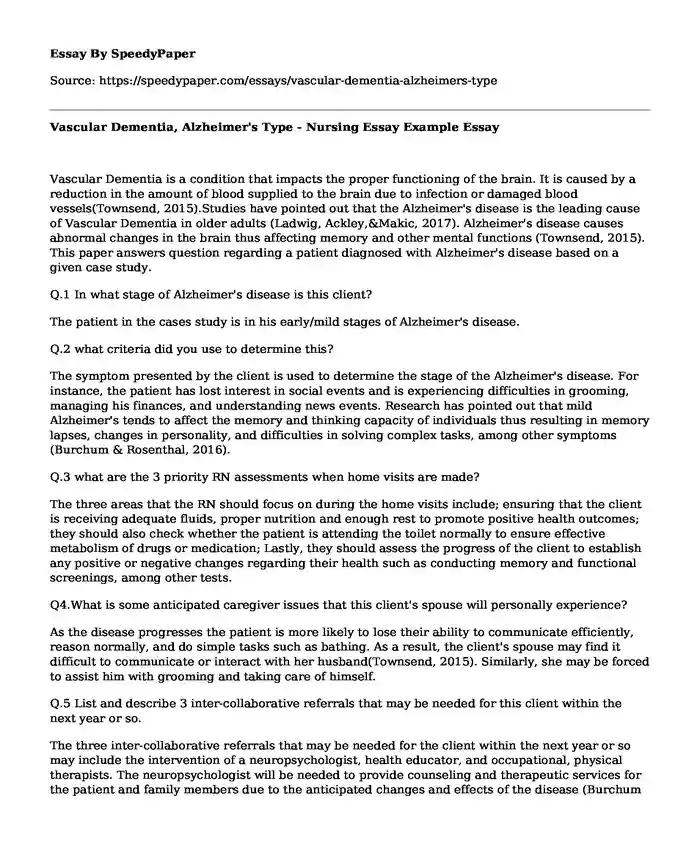
| Type of paper: | Essay |
| Categories: | Nursing care Dementia |
| Pages: | 2 |
| Wordcount: | 547 words |
Vascular Dementia is a condition that impacts the proper functioning of the brain. It is caused by a reduction in the amount of blood supplied to the brain due to infection or damaged blood vessels(Townsend, 2015).Studies have pointed out that the Alzheimer's disease is the leading cause of Vascular Dementia in older adults (Ladwig, Ackley,&Makic, 2017). Alzheimer's disease causes abnormal changes in the brain thus affecting memory and other mental functions (Townsend, 2015). This paper answers question regarding a patient diagnosed with Alzheimer's disease based on a given case study.
Q.1 In what stage of Alzheimer's disease is this client?
The patient in the cases study is in his early/mild stages of Alzheimer's disease.
Q.2 what criteria did you use to determine this?
The symptom presented by the client is used to determine the stage of the Alzheimer's disease. For instance, the patient has lost interest in social events and is experiencing difficulties in grooming, managing his finances, and understanding news events. Research has pointed out that mild Alzheimer's tends to affect the memory and thinking capacity of individuals thus resulting in memory lapses, changes in personality, and difficulties in solving complex tasks, among other symptoms (Burchum & Rosenthal, 2016).
Q.3 what are the 3 priority RN assessments when home visits are made?
The three areas that the RN should focus on during the home visits include; ensuring that the client is receiving adequate fluids, proper nutrition and enough rest to promote positive health outcomes; they should also check whether the patient is attending the toilet normally to ensure effective metabolism of drugs or medication; Lastly, they should assess the progress of the client to establish any positive or negative changes regarding their health such as conducting memory and functional screenings, among other tests.
Q4.What is some anticipated caregiver issues that this client's spouse will personally experience?
As the disease progresses the patient is more likely to lose their ability to communicate efficiently, reason normally, and do simple tasks such as bathing. As a result, the client's spouse may find it difficult to communicate or interact with her husband(Townsend, 2015). Similarly, she may be forced to assist him with grooming and taking care of himself.
Q.5 List and describe 3 inter-collaborative referrals that may be needed for this client within the next year or so.
The three inter-collaborative referrals that may be needed for the client within the next year or so may include the intervention of a neuropsychologist, health educator, and occupational, physical therapists. The neuropsychologist will be needed to provide counseling and therapeutic services for the patient and family members due to the anticipated changes and effects of the disease (Burchum & Rosenthal, 2016). The occupational, physical therapist will help in ensuring that the patient is living in a safe environment and provide cognitive training skills. Similarly, the health educator will coordinate the distribution of health information materials consistent with the nurse practitioner and other health care providers recommendations.
References
Burchum, J. R., & Rosenthal, L.D. (2016). Lehne's pharmacology for nursing care (9th ed.). St. Louis, MO: Elsevier
Ladwig, G., Ackley, B., &Makic, M. (2017). Mosby's guide to nursing diagnosis (5th ed.). St. Louis, MO: Elsevier.
Townsend, M. (2015). Psychiatric mental health nursing: Concepts of care in evidence-based practice (8th ed.). Philadelphia, PA: F.A. Davis.
Cite this page
Vascular Dementia, Alzheimer's Type - Nursing Essay Example. (2022, Apr 05). Retrieved from https://speedypaper.net/essays/vascular-dementia-alzheimers-type
Request Removal
If you are the original author of this essay and no longer wish to have it published on the SpeedyPaper website, please click below to request its removal:
- God and the Problem of Evil - Free Essay with Article Analysis
- Essay Example on Mall Ethnography
- Russian Formalism - Literary Essay Sample
- Essay Example Evaluating Health Care Information System
- Paper Example on Answering the Question: Can Organizations be Treated as Persons?
- Free Essay Example: Business Analytics in CRM
- Alzheimer's and Other Dementias' Impact in Communities of Color, Free Essay to Download
Popular categories




